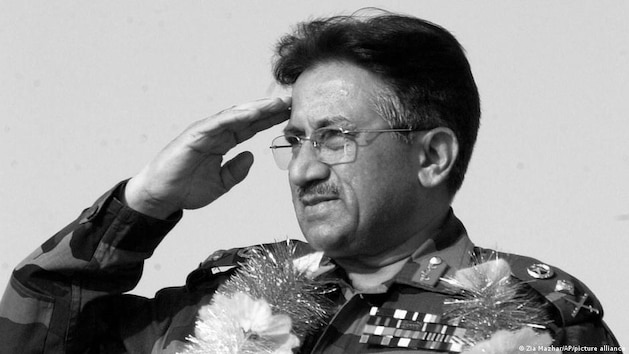Pervez Musharraf was born in New Delhi in August 1943, four years before the partition of British India that later became Pakistan. As a child, Musharraf lived and attended school in Turkey before the family returned to Pakistan in 1956. After school, he decided to pursue a career in the military, thereby laying the foundation for his later advancement. In the years 1965 and 1971 Musharraf was involved as an officer in the armed conflicts with India.
As army chief, Musharraf was responsible on the Pakistani side for the so-called Kargil War with India from May to July 1999. The trigger was the advance of Pakistani units to the Indian side of the ceasefire line in disputed Kashmir. The military adventure with hundreds of dead on both sides did not pay off for Pakistan, the ally USA drew closer to the rival India.
Among other things, disagreements between Prime Minister Nawaz Sharif and the army leadership over the Kargil conflict led to Musharraf’s military coup in October 1999. Sharif went into exile in Saudi Arabia.
After the attacks of September 11, 2001, Musharraf was forced to become an ally of the US in the fight against the Taliban and against al Qaeda. In the course of this struggle, Musharraf was “forced to unleash a civil war on his own territory” in the north-western border areas, as the British Pakistan expert Anatol Lieven puts it.
In doing so, he made himself a target for Islamist forces in Pakistan, who accused him of being too close to the “imperialist” USA. Musharraf survived at least three assassination attempts during his seven-year tenure from 2001 to 2008. In 2007, Musharraf stormed the Red Mosque in downtown Islamabad after Islamists had repeatedly attacked from there. At least 150 people are said to have died during the 36-hour siege.
In the same year, Benazir Bhutto, leader of the Pakistan People’s Party (PPP) opposition, was killed in an attack in the northern Pakistani city of Rawalpindi. Leading judges and lawyers accused Musharraf of failing to ensure their safety.
As President of Pakistan, Musharraf engaged in a bitter power struggle with the country’s independent judiciary. This struggle culminated in November 2007, when Musharraf declared a state of emergency and removed the Chief Justice of the Supreme Court, Iftikhar Chaudhry. As a result, there were nationwide protests by lawyers.
Musharraf’s political career went downhill after his arch-rivals, the now-returned ex-Prime Minister Nawaz Sharif and Asif Zardari, Benazir Bhutto’s widower, launched an impeachment trial against Musharraf in Parliament in August 2008. Eleven days later, Musharraf announced his resignation from the presidency and went into exile in Dubai.
Musharraf’s attempted return to power in the May 2013 general election failed miserably. Despite death threats from extremists and various pending indictments by Pakistani courts, he attempted a comeback.
In March he was greeted in Karachi by several hundred supporters and activists of his newly formed All Pakistan Muslim League. But that was the end of his new political start. The ex-army chief was arrested in connection with the assassination of Benazir Bhutto and banned from political activities for life. Musharraf was placed under house arrest at his compound on the outskirts of Islamabad.
In 2016, the house arrest and a travel ban were lifted to allow Musharraf to receive medical treatment abroad. He traveled again to the United Arab Emirates, where he would remain until the end of his life. Pervez Musharraf died on Sunday at the age of 79 in a Dubai hospital.
During his reign, Musharraf persistently tried to be legitimized by the country’s judiciary and to secure the support of elected politicians, writes Pakistan expert Lieven. This raises the question of whether Musharraf should be called a military dictator at all. “In any case, by international and historical standards, he was a very weak one.”
Musharraf envisioned an “enlightened Pakistan”. He was unable to implement important parts of his reform program, such as democratic structures at the local level. He had more success with other initiatives, the fruits of which have outlasted his tenure. These include his commitment to the active role of women in politics and greater freedom for the media in Pakistan.
Author: Maqbool Malik
Dieter Bohlen has to dress warmly. DSDS juror Katja Krasavice is violently against him – and does not seem to be finished yet. She shared an explosive video on TikTok, including private Whatsapp messages.
What exactly was behind the Chinese espionage operation with the balloon is still unclear. The already tense relations between the USA and China are becoming even more difficult as a result.
The original of this article “Unlucky ally – Pakistan’s ex-president Pervez Musharraf is dead” comes from Deutsche Welle.








